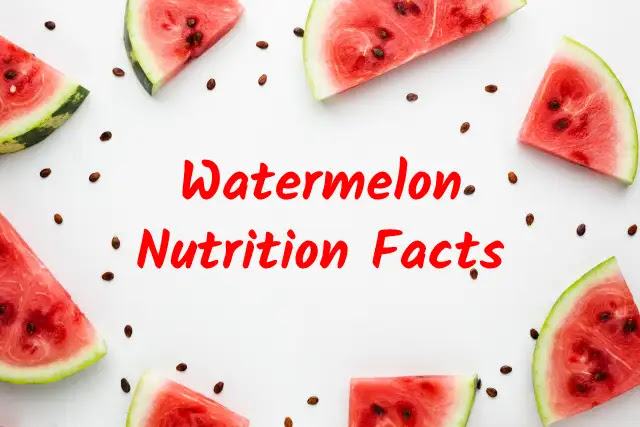Watermelon Nutrition Facts: Watermelon is a popular fruit that is enjoyed by many people all over the world. Not only is it a delicious and refreshing way to cool off on a hot day, but it is also packed with a variety of essential nutrients that can benefit your health in many ways. In this article, we will take a closer look at the nutrition facts of watermelon and discuss the various health benefits that it can provide.
Nutrition Facts
Watermelon is a low-calorie food that is high in water content. It is also a good source of vitamins A and C, as well as antioxidants. A single cup of diced watermelon contains the following nutrients:
| Nutrient | Amount per 1 cup diced (152g) |
|---|---|
| Calories | 46 |
| Total Fat | 0.6g |
| Saturated Fat | 0.1g |
| Cholesterol | 0mg |
| Sodium | 1mg |
| Total Carbohydrates | 12g |
| Dietary Fiber | 1g |
| Sugars | 9g |
| Protein | 1.5g |
| Vitamin C | 21% of the Daily Value (DV) |
| Vitamin A | 9% of the DV |
| Vitamin B6 | 5% of the DV |
| Vitamin B12 | 0% of the DV |
| Vitamin E | 2% of the DV |
| Vitamin K | 4% of the DV |
| Calcium | 1% of the DV |
| Iron | 2% of the DV |
| Magnesium | 2% of the DV |
| Potassium | 5% of the DV |
Health Benefits of Watermelon
Hydration
One of the most obvious benefits of watermelon is its high water content. Watermelon is made up of 92% water, making it an excellent source of hydration. This makes it a great option for staying hydrated during the hot summer months or during intense exercise. Eating watermelon can help you stay hydrated and keep your body functioning properly.
May Help Lower Blood Pressure
Watermelon contains an amino acid called citrulline, which has been shown to help relax blood vessels and improve blood flow. This can help to lower blood pressure and reduce the risk of heart disease. High blood pressure is a leading risk factor for heart disease and stroke, so incorporating watermelon into your diet may help to reduce your risk of these conditions.
May Improve Digestion
The high water and fiber content in watermelon can also help to improve digestion and prevent constipation. Watermelon is also a good source of fiber, which is important for maintaining a healthy digestive system. Eating watermelon can help to keep your bowels regular and prevent constipation.
May Boost Immune System
Watermelon is a good source of vitamin C, which is known to boost the immune system and help fight off infections. Vitamin C is an important nutrient for maintaining a healthy immune system, and watermelon is a great way to get your daily dose. Eating watermelon can help to keep your immune system strong and protect you from infections.
May Help with Weight Loss
Watermelon is a low-calorie food that is high in water content, which makes it a great option for those trying to lose weight. Eating watermelon as a snack can help you feel full and satisfied without consuming a lot of calories. Additionally, the high water content in watermelon can help to flush out toxins and waste products from the body, which can help with weight loss.
May Help with Inflammation
Watermelon contains antioxidants and anti-inflammatory properties that can help to reduce inflammation throughout the body. Inflammation is a natural response to injury or infection, but chronic inflammation can lead to a variety of health problems, including heart disease, cancer, and diabetes. Eating watermelon can help to reduce inflammation and protect against these conditions.
May Help with Skin Health
Watermelon is rich in antioxidants, including vitamin C and lycopene, which can help to protect the skin from damage caused by the sun's ultraviolet (UV) rays. These antioxidants can help to prevent sunburn and reduce the risk of skin cancer. Additionally, watermelon can help to improve the overall health and appearance of the skin, making it softer and more radiant.
May Help with Bone Health
Watermelon is also a good source of potassium, which is an important mineral for maintaining healthy bones. Potassium helps to regulate the balance of calcium and phosphorus in the body, which is crucial for building and maintaining strong bones. Eating watermelon can help to ensure that your body has enough potassium to support strong and healthy bones.
May Help with Eye Health
Watermelon is also a good source of vitamin A, which is essential for maintaining healthy eyes. Vitamin A helps to protect the eyes from damage and is necessary for good vision. Eating watermelon can help to ensure that your body has enough vitamin A to support healthy eyes.
Conclusion
Watermelon is a delicious and nutritious fruit that is packed with a variety of essential nutrients. Whether you are looking to stay hydrated, lower your blood pressure, improve your digestion, boost your immune system, reduce inflammation, improve skin and bone health, or protect your eyes, watermelon can help. So next time you are looking for a refreshing and healthy snack, reach for a slice of watermelon! It's a great way to enjoy a tasty treat while also taking care of your health. Incorporating watermelon into your diet is an easy way to ensure that your body is getting the nutrients it needs to function properly.








![[100+] गौरैया के बारे में रोचक तथ्य - Facts About Sparrow in Hindi](https://blogger.googleusercontent.com/img/b/R29vZ2xl/AVvXsEjAMPNSpkqO8-9akUiPokDXHagmsQFwp-aZl-19OFI6ZL3MLknwTd6PUp3aQy9z_kWHrPvtY1aKkGV8ybbyuIuobUEPhEq-ctYtgNg56vOT3Uui-kbyp476SdBCUQ3KRj0TpAxc4H84_K79/w100/ezgif.com-gif-maker+%25281%2529.webp)





0 Comments